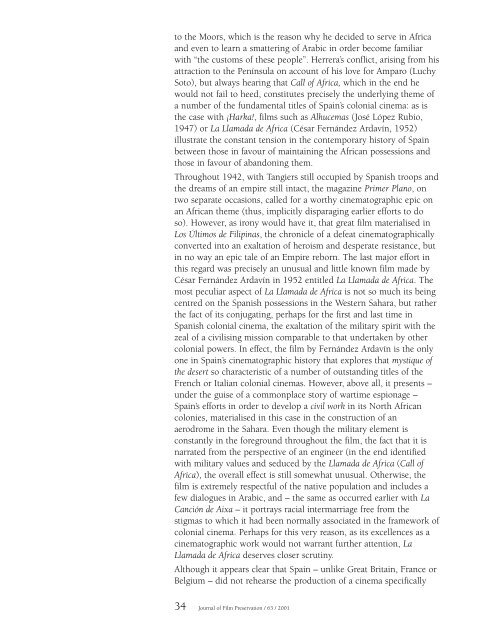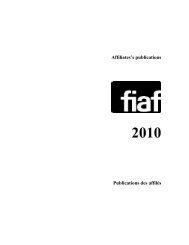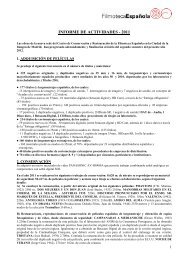Journal of Film Preservation - FIAF
Journal of Film Preservation - FIAF
Journal of Film Preservation - FIAF
You also want an ePaper? Increase the reach of your titles
YUMPU automatically turns print PDFs into web optimized ePapers that Google loves.
to the Moors, which is the reason why he decided to serve in Africa<br />
and even to learn a smattering <strong>of</strong> Arabic in order become familiar<br />
with “the customs <strong>of</strong> these people”. Herrera’s conflict, arising from his<br />
attraction to the Península on account <strong>of</strong> his love for Amparo (Luchy<br />
Soto), but always hearing that Call <strong>of</strong> Africa, which in the end he<br />
would not fail to heed, constitutes precisely the underlying theme <strong>of</strong><br />
a number <strong>of</strong> the fundamental titles <strong>of</strong> Spain’s colonial cinema: as is<br />
the case with ¡Harka!, films such as Alhucemas (José López Rubio,<br />
1947) or La Llamada de Africa (César Fernández Ardavín, 1952)<br />
illustrate the constant tension in the contemporary history <strong>of</strong> Spain<br />
between those in favour <strong>of</strong> maintaining the African possessions and<br />
those in favour <strong>of</strong> abandoning them.<br />
Throughout 1942, with Tangiers still occupied by Spanish troops and<br />
the dreams <strong>of</strong> an empire still intact, the magazine Primer Plano, on<br />
two separate occasions, called for a worthy cinematographic epic on<br />
an African theme (thus, implicitly disparaging earlier efforts to do<br />
so). However, as irony would have it, that great film materialised in<br />
Los Últimos de Filipinas, the chronicle <strong>of</strong> a defeat cinematographically<br />
converted into an exaltation <strong>of</strong> heroism and desperate resistance, but<br />
in no way an epic tale <strong>of</strong> an Empire reborn. The last major effort in<br />
this regard was precisely an unusual and little known film made by<br />
César Fernández Ardavín in 1952 entitled La Llamada de Africa. The<br />
most peculiar aspect <strong>of</strong> La Llamada de Africa is not so much its being<br />
centred on the Spanish possessions in the Western Sahara, but rather<br />
the fact <strong>of</strong> its conjugating, perhaps for the first and last time in<br />
Spanish colonial cinema, the exaltation <strong>of</strong> the military spirit with the<br />
zeal <strong>of</strong> a civilising mission comparable to that undertaken by other<br />
colonial powers. In effect, the film by Fernández Ardavín is the only<br />
one in Spain’s cinematographic history that explores that mystique <strong>of</strong><br />
the desert so characteristic <strong>of</strong> a number <strong>of</strong> outstanding titles <strong>of</strong> the<br />
French or Italian colonial cinemas. However, above all, it presents –<br />
under the guise <strong>of</strong> a commonplace story <strong>of</strong> wartime espionage –<br />
Spain’s efforts in order to develop a civil work in its North African<br />
colonies, materialised in this case in the construction <strong>of</strong> an<br />
aerodrome in the Sahara. Even though the military element is<br />
constantly in the foreground throughout the film, the fact that it is<br />
narrated from the perspective <strong>of</strong> an engineer (in the end identified<br />
with military values and seduced by the Llamada de Africa (Call <strong>of</strong><br />
Africa), the overall effect is still somewhat unusual. Otherwise, the<br />
film is extremely respectful <strong>of</strong> the native population and includes a<br />
few dialogues in Arabic, and – the same as occurred earlier with La<br />
Canción de Aixa – it portrays racial intermarriage free from the<br />
stigmas to which it had been normally associated in the framework <strong>of</strong><br />
colonial cinema. Perhaps for this very reason, as its excellences as a<br />
cinematographic work would not warrant further attention, La<br />
Llamada de Africa deserves closer scrutiny.<br />
Although it appears clear that Spain – unlike Great Britain, France or<br />
Belgium – did not rehearse the production <strong>of</strong> a cinema specifically<br />
34 <strong>Journal</strong> <strong>of</strong> <strong>Film</strong> <strong>Preservation</strong> / 63 / 2001

















